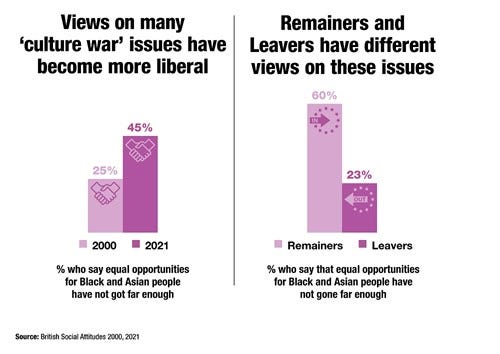The long term liberalising of Britain
Welcome to the latest edition of The Week in Polls. As ever, if you have any feedback or questions prompted by what follows, or spotted some other recent polling you’d like to see covered, just hit reply. I personally read every response.
If you’d like more news about the Lib Dems specifically, you can sign up for my monthly Liberal Democrat Newswire.
My privacy policy and related legal information is available here. Please note that if you are subscribed to other email lists of mine, unsubscribing from this list will not automatically remove you from the other lists. If you wish to be removed from all lists, simply hit reply and let me know.
Britain keeps on becoming more liberal
If I had the talent to write a full book about British politics and society, I’d call it something like, The Two Speed Liberalisation of Britain. It’d be about the conundrum - for liberals, frustrating conundrum - of British politics in the last half century. The country has been getting steadily more liberal, yet it’s the Conservative Party which keeps on winning general elections. Two out of three general election wins go to them.
There’s a variety of reasons why those long-term changes haven’t prompted an era of liberal, or Liberal Democrat, electoral triumph. It’s partly about the electoral system. (Conservatives may win but they don’t win with over 50% of the vote.) It’s partly because the political differences in Britain are more complicated than non-liberal versus liberal. (I’ll leave it to readers to argue out the relative liberalness of Nicholas Ridley and Charles Clarke.)
But perhaps most of all it’s about the way the Conservative Party has kept on opposing liberalising trends before going on to embrace them. You only have to go as far back as David Cameron to find a batch of ‘culture war’ issues which the Conservative Party was split over and yet which now not even Cabinet ministers flirting with the right through the media talk about wanting to undo. Allowing same-sex couples to adopt or then marry about but two examples of where many Conservatives fought the culture war, lost the culture war and have given up on trying to refight that culture war.
As a result, as I’ve written before:
Long-term and sustained demographic and social changes are making our country more liberal. But not every part of society is becoming more liberal at the same rate. As a result, although overall we’re been becoming more liberal, the gaps between how liberal people are have also widened. That therefore serves up the paradoxical mix of both the country becoming more liberal and liberalism feeling under threat due to the increasing gaps caused by two-speed liberalisation.
(For more on that, take a listen to my podcast with Professor Rob Ford.)
But I don’t have the talent to write that book, and this is a newsletter about polling. So let’s take a look at some more of the polling evidence about that long-term liberalisation, courtesy of some new analysis from Professor
:The public is increasingly liberal on cultural issues...
This growing social liberalism is a steady trend since 2005 and applies to all voters (though not evenly). In terms of understanding the electoral consequences, the distance between party supporters and the average voter is worth reflecting on. In 2019, Labour voters were more liberal than the average voter by a greater distance that at any point in the last thirty years. The party’s vote has increasingly become more socially liberal than the electorate since 2010 - hence there being some element of truth to the claim Labour’s vote has grown somewhat out of step from the electorate overall. It is a stretch, though, to argue that Labour supporters are all ‘hyper-liberals’, just as it is just not credible to describe the Conservative vote as a whole as ‘radical right’. Indeed, the social conservativism of the Conservative vote in 2019 was further from the average voter than it had been for many elections - both parties polarised to some degree on the cultural dimension.
He goes on to note that the shift to liberalism has continued since 2019 and the picture is supported by other data. Even the Red Wall, though less liberal than the rest of the country, has seen a steady liberalising trend.
It’s also common to see the public on the liberal side of the current tranche of culture war topics, such as these findings from people who to go to football matches:

As I dug into earlier this month, even on the death penalty - the one issue with strong culture war overtones which the right hasn’t given up on completely despite having comprehensively lost the legislative battle decades ago - support now frequently drops below 50% depending on how the question is examined.
More liberal and more polarised: it’s a nuanced story but one neatly summarised by a simple graphic from NatCen following their in-depth study of this issue:
It’s a story I’m sure I’ll be returning to regularly.
National voting intention polls
Here’s the latest from each currently active pollster:
No news to report: it’s large Labour leads across the board, even from the pollsters whose methodologies give the smallest Labour leads.
For more details and updates through the week, see my daily updated table here.
Last week’s edition
What do Brexit voters think of Brexit?
Know other people interested in political polling?
The UK’s positive attitudes towards immigration, and other insights from this week’s polling…
Keep reading with a 7-day free trial
Subscribe to The Week in Polls to keep reading this post and get 7 days of free access to the full post archives.





